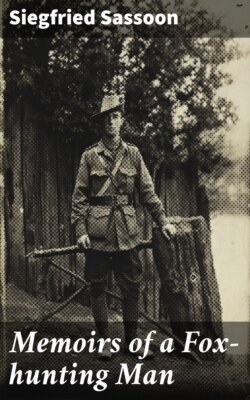Читать книгу Memoirs of a Fox-hunting Man - Siegfried Sassoon - Страница 9
На сайте Литреса книга снята с продажи.
*******
ОглавлениеTable of Contents
I had always been given to understand that I had a delicate constitution. This was one of the reasons which my aunt urged against my being sent to school when Mr. Pennett, the pink-faced solicitor who had charge of our affairs, paid us one of his periodic visits and the problem of my education was referred to in my presence. The solicitor used to come down from London for the day. In acknowledgment of his masculinity my aunt always conceded him the head of the table at lunch. I can remember him carving a duck with evident relish, and saying in somewhat unctuous tones, “Have you reconsidered, my dear Miss Evelyn, the well-worn subject of a school for our young friend on my left?”
And I can hear my aunt replying in a fluttering voice that she had always been nervous about me since I had pneumonia (though she knew quite well that it was only slight inflammation of the lungs, and more than two years ago at that). Fixing my gaze on his fat pearl tie-pin, I wondered whether I really should ever go to school, and what it would feel like when I got there. Nothing was said about Mr. Star, but Mr. Pennett usually had a private conversation with him on the subject of my progress.
“Your guardian seems an extremely well-informed gentleman,” Mr. Star would say to me after one of these interviews. For Mr. Pennett had been to Harrow, and when Mr. Star spoke of him I was vaguely aware that he had made the modest old man feel even more humble than usual. My aunt was perfectly satisfied with Mr. Star, and so was I. But the solicitor knew that I was growing out of my tutor; and so, perhaps, did Mr. Star himself.... Indeed, I was getting to be quite a big boy for my age. People in the village were saying that I was ‘filling out a fair treat,’ and ‘shooting up no end.’ ...
To one little incident I can give an exact date—not always an easy thing to do when one is looking back such a long way. It was in 1896, on the last Wednesday in May, and I had just returned from my afternoon ride. My aunt was out in the garden, wearing her leather gauntlets to cut some lilac, when I dashed excitedly across the lawn shouting, “Isn’t it splendid, Auntie—the Prince of Wales has won the Derby!”
“Oh, how splendid—has he really?” she exclaimed, dropping the branch of white lilac which she had just snipped off the tree with her huge pair of scissors.
“Yes,” I continued, bursting with the important news, “we stopped at the station on our way home, and the station-master showed Dixon the telegram.”
“What was it called?” she queried.
“Persimmon, of course; I should have thought you’d have known that!”
“Really, Georgie dear, you shouldn’t speak so rudely to your aunt.”
I was silent for a moment, feeling crestfallen. Then I remarked, in a subdued voice: “Earwig was third.”
“Earwig! What an odd name for a horse!” And then, as I bent down to pick up a spray of lilac, she added: “Good gracious, darling, how you’ve grown out of your riding-breeks! I really must get you another corduroy suit.” ...
But my increasing size had another and far more important effect. I was growing out of Rob Roy. My aunt showed her inevitable lack of initiative in the matter: she said that a small pony was safer for me. During the summer, however, Dixon persistently drew her attention to the obvious fact that my legs were getting nearer and nearer to the ground, although he had the highest respect for gallant little Rob Roy, who was beloved by all who knew him. The end of it was that a ‘perfect home’ was found for him, and he trotted out of my life as gaily as he had trotted into it. After his departure I had a good cry by myself in the kitchen garden.
“I shall never be so fond of anyone again as I was of Rob Roy,” I thought, mopping my eyes with a grubby handkerchief. Subsequent events proved my prophecy incorrect. And anyhow it was a fine day, early in September; a few minutes afterwards I was clambering up into a plum tree. The plums were particularly good that year.
